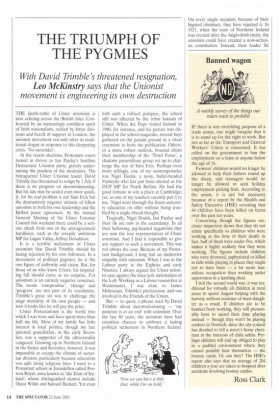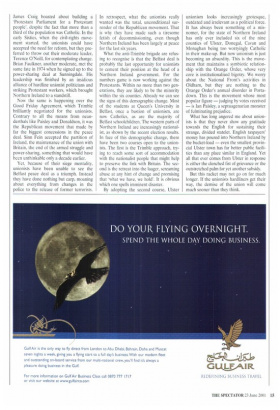THE TRIUMPH OF THE PYGMIES
With David Trimble's threatened resignation, Leo McKinstry says that the Unionist movement is engineering its own destruction
THE death-rattle of Ulster unionism is now echoing across the British Isles. Confronted by an increasingly confident spirit of Irish nationalism, racked by bitter divisions and bereft of support in London, the unionist movement can only utter its traditional slogan in response to this deepening crisis: 'No surrender'.
At the recent elections, Protestant voters turned in droves to Ian Paisley's hardline Democratic Unionist party, gravely undermining the position of the moderates. The beleaguered Ulster Unionist leader David Trimble has threatened to resign by 1 July if there is no progress on decommissioning. But his fate may be sealed even more quickly, for his real problem is not Sinn Fein but the destructively negative attitude of fellow unionists to both his own leadership and the Belfast peace agreement. At the Annual General Meeting of the Ulster Unionist Council this weekend there could be a serious attack from one of the anti-agreement hardliners, such as the creepily ambitious MP for Eagan Valley, Jeffrey Donaldson.
It is a terrible indictment of Ulster unionism that David Trimble should be facing rejection by his own followers. In a movement of political pygmies, he is the one figure of authority and vision. But, for those of us who know Ulster, his impending fall should come as no surprise. For unionism is an entirely negative construct. The words 'compromise', 'change' and 'progress' are not part of its vocabulary. Trimble's great sin was to challenge the siege mentality of his own people — and now it looks like he will pay the price.
Ulster Protestantism is the world into which I was born and have spent more than half my life. Most of my family has little interest in local politics, though my late paternal grandfather, in the early Seventies, was a supporter of the ultra-loyalist vanguard. Growing up in Northern Ireland in the Sixties and Seventies, however, it was impossible to escape the climate of sectarian division, particularly because education was split along religious lines. I went to a Protestant school in Enniskillen called Portora Royal, once known as 'the Eton of Ireland', whose distinguished alumni include Oscar Wilde and Samuel Beckett. Yet even with such a refined pedigree, the school still was affected by the tribal hatreds of Ulster. When the Pope visited Ireland in 1980, for instance, and his picture was displayed in the school magazine, several boys gathered on the parade ground in a ritual ceremony to burn the publication. Others, of a more robust outlook, boasted about their membership of the 'Third Force', a shadowy paramilitary group set up to challenge the rise of Sinn Fein. Perhaps even more tellingly, one of my contemporaries was Nigel Dodds, a noisy, bullet-headed Paisleyite who has just been elected as the DUP MP for North Belfast. He had the good fortune to win a place at Cambridge; yet, as one of my teachers recently put it to me, 'Nigel went through the finest university education on offer without being troubled by a single liberal thought.'
Tragically, Nigel Dodds, Ian Paisley and their ilk are now in the ascendancy. In all their bellowing, pig-headed negativism they are now the true representatives of Ulster unionism. And I find it impossible to give any support to such a movement. This was not always the case. Because of my Protestant background, I long had an instinctive empathy with unionism. When I was in the Labour party in the Eighties and early Nineties, I always argued the Ulster unionist case against the knee-jerk nationalism of the Left. Working as a Labour researcher at Westminster, I was close to James Molyneaux, Trimble's predecessor, and was involved in the Friends of the Union.
But — to quote a phrase used by David Trimble about decommissioning — 'my patience is at an end' with unionism. Over the last 80 years, the unionists have had countless chances to embrace a lasting political settlement in Northern Ireland. On every single occasion, because of their bigoted obstinacy, they have rejected it. In 1921, when the state of Northern Ireland was created after the Anglo-Irish treaty, the unionists could have created a non-sectarian constitution. Instead, their leader Sir James Craig boasted about building a Protestant Parliament for a Protestant people', despite the fact that more than a third of the population was Catholic. In the early Sixties, when the civil-rights movement started, the unionists could have accepted the need for reform, but they preferred to throw out their moderate leader, Terence O'Neill, for contemplating change. Brian Faulkner, another moderate, met the same fate in 1974 when he signed up to the power-sharing deal at Sunningdale. His leadership was finished by an insidious alliance of hardline unionist politicians and striking Protestant workers, which brought Northern Ireland to a standstill.
Now the same is happening over the Good Friday Agreement, which Trimble brilliantly negotiated for the unionists. Contrary to all the moans from neanderthals like Paisley and Donaldson, it was the Republican movement that made by far the biggest concessions in the peace deal. Sinn Fein accepted the partition of Ireland, the maintenance of the union with Britain, the end of the armed struggle and power-sharing, something that would have been unthinkable only a decade earlier.
Yet, because of their siege mentality, unionists have been unable to see the Belfast peace deal as a triumph. Instead they have done nothing but carp, moaning about everything from changes in the police to the release of former terrorists. In retrospect, what the unionists really wanted was the total, unconditional surrender of the Republican movement. That is why they have made such a tiresome fetish of decommissioning, even though Northern Ireland has been largely at peace for the last six years.
What the anti-Trimble brigade are refusing to recognise is that the Belfast deal is probably the last opportunity for unionists to cement their position at the head of a Northern Ireland government. For the numbers game is now working against the Protestants. Within no more than two generations, they are likely to be the minority within the six counties. Already we can see the signs of this demographic change. Most of the students at Queen's University in Belfast. once a bastion of unionism, are now Catholics, as are the majority of Belfast schoolchildren. The western parts of Northern Ireland are increasingly nationalist, as shown by the recent election results. In face of this demographic change, there have been two courses open to the unionists. The first is the Trimble approach, trying to reach some sort of accommodation with the nationalist people that might help to preserve the link with Britain. The second is the retreat into the laager, screaming abuse at any hint of change and promising that 'what we have, we hold', It is obvious which one spells imminent disaster.
By adopting the second course, Ulster unionism looks increasingly grotesque, outdated and irrelevant as a political force. It has always been something of a misnomer, for the state of Northern Ireland has only ever included six of the nine counties of Ulster, Donegal, Cavan and Monaghan being too worryingly Catholic in their make-up. But now unionism is just becoming an absurdity. This is the movement that maintains a symbiotic relationship with the Orange Order, whose very core is institutionalised bigotry. We worry about the National Front's activities in Oldham, but they are nothing to the Orange Order's annual disorder in Portadown. This is the movement whose most popular figure — judging by votes received — is Ian Paisley, a septuagenarian monster of fulminating prejudice.
What has long angered me about unionists is that they never show any gratitude towards the English for sustaining their strange, divided statelet. English taxpayers' money has poured into Northern Ireland by the bucket-load — even the smallest provincial Ulster town has far better public facilities than any place similar in England. Yet all that ever comes from Ulster in response is either the clenched fist of grievance or the outstretched palm for yet another subsidy.
But this racket may not go on for much longer. If the unionists hardliners get their way, the demise of the union will come much sooner than they think.



































































 Previous page
Previous page